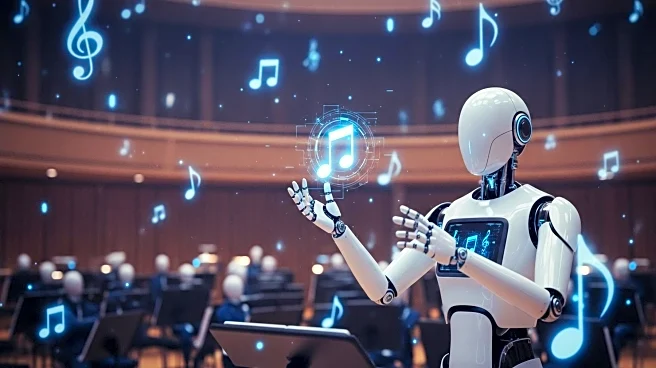What's Happening?
Recent developments in AI music licensing are focusing on how AI companies can legally use copyrighted music to train their algorithms. A significant move in this area is the establishment of collective licensing deals, such as the one announced by the Swedish collecting society STIM. This deal allows AI companies to use copyrighted works for training purposes in exchange for compensation to rightsholders. The complexity of these agreements lies in the fact that music created by AI is not typically covered by copyright, which means it can be used freely. However, these new agreements aim to provide rightsholders with a revenue stream from AI-generated music that uses their original works. The deals are seen as experimental, as it remains unclear whether the copying of works for AI training requires a license under current U.S. copyright law.
Why It's Important?
The significance of these developments lies in their potential impact on the music industry and copyright law. As AI-generated music becomes more prevalent, rightsholders are seeking ways to ensure they are compensated for the use of their works. This could lead to a shift in how music rights are managed and monetized, potentially affecting songwriters, publishers, and AI companies. The agreements could set a precedent for how AI-generated content is treated under copyright law, influencing future legislation and business models. Rightsholders stand to gain from ongoing revenue streams, while AI companies may face new obligations and costs.
What's Next?
As these licensing agreements are still in their early stages, their effectiveness and impact remain to be seen. Stakeholders in the music industry will likely monitor these developments closely, as they could influence future negotiations and legal frameworks. AI companies may need to adapt their business models to comply with new licensing requirements, while rightsholders may explore additional ways to protect and monetize their works. The evolution of these agreements could also prompt discussions on broader copyright reforms to address the challenges posed by AI-generated content.
Beyond the Headlines
The ethical and legal implications of AI music licensing are significant. These agreements raise questions about the balance between innovation and intellectual property rights. As AI technology advances, the music industry may need to reconsider traditional notions of authorship and ownership. Additionally, the global nature of AI and music distribution could complicate efforts to enforce these agreements across different jurisdictions. The long-term impact on creativity and the value of human artistry in music is also a topic of concern.









